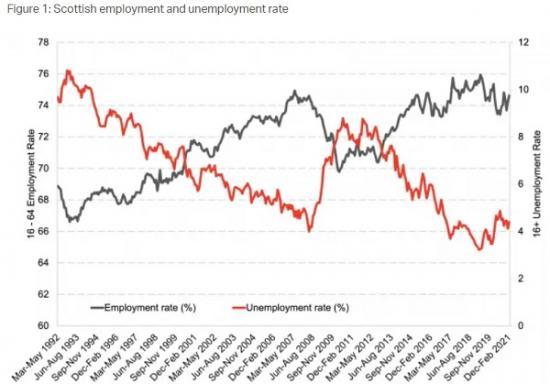Election 2021 - The Latest Labour Market Data In Context And The Challenges Ahead
22nd April 2021

Fraser of Allender article.
Conditions in the labour market are a key indicator of the underlying health of the wider economy, and the labour market is a key driver of economic prosperity for people across the country. This article reviews the latest labour market data, puts it into a historic context, discusses the role that policy has played in shaping labour market outcomes through the pandemic, and sets out some of the issues and challenges that lie ahead.
----------------------
Conditions in the labour market are a key indicator of the underlying health of the wider economy, and the labour market is a key driver of economic prosperity for people across the country.
In this article, I review the latest labour market data, put it into a historic context, discuss the role that policy has played in shaping labour market outcomes through the pandemic, and set out some of the issues and challenges that lie ahead.
Labour market powers
Government plays a key role in shaping economic outcomes in the labour market; from providing social safety nets for those who become unemployed or who cannot find work, through to providing skills and training to support people to secure a job (or get a better job).
In Scotland, responsibility for several key policy areas affecting the labour market is devolved, while a number of headline policies remain UK wide.
The devolved economic drivers, controlled by the Scottish Parliament, are mostly focussed on the longer-term drivers of labour market outcomes. These include things like investment in education, skills and employability. But there are broader levers Holyrood controls that will have an impact too on labour market outcomes, such as powers over income tax (although as set out here, the fiscal framework complicates their use) and areas such as transport and housing which all impact upon how easy it is for someone to find work.
Powers over labour market regulation, for example employment rights, the minimum wage and job seekers allowance are reserved to the UK Parliament. The UK retains primary responsibility for macroeconomic stability too, a key driver of the labour market.
With the devolution of welfare powers in recent years, some newer policy levers are beginning to be controlled from Scotland.
It's not just in specific policy priorities that the Scottish Government has influence over the labour market. Through government procurement and so—called ‘convening' abilities (for example bringing together businesses, trades unions and others to try to agree common objectives) there are indirect channels through which the government can have significant influence.
A good example of this sort of activity is the Scottish Government's ‘Fair Work' focus through the Fair Work Convention.
Read the full article HERE
